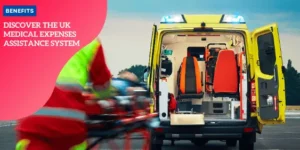Financial Support from the NHS: How to Obtain Assistance for Medical Expenses

The National Health Service (NHS) is renowned for providing comprehensive and affordable healthcare.
However, for medical expenses beyond basic services, the NHS offers a financial assistance system to ensure that all citizens can access essential treatments and services.
✅In this text, we will explore how this system operates, the eligibility criteria, and how to determine if an individual qualifies for financial assistance.
Understanding the NHS Financial Assistance System
The NHS financial assistance system covers a variety of additional expenses, including prescriptions, dental treatments, vision tests, eyeglasses, contact lenses, wigs, fabric supports, and even travel costs for specialized treatments. This comprehensive support ensures that individuals are not financially burdened by necessary health-related expenses, which can often be significant.
✅ This support is essential to ensure that financial barriers do not hinder access to necessary healthcare.
By covering these additional costs, the NHS helps to maintain equitable access to healthcare services for all citizens, regardless of their financial situation.
To initiate the process of obtaining financial assistance, patients must first understand the areas where assistance is available.
This includes consulting healthcare professionals, pharmacists, or treatment administrators to determine which additional expenses may be covered by the NHS.
✅ This includes consulting healthcare professionals, pharmacists, or treatment administrators to determine which additional expenses may be covered by the NHS.
These consultations can help patients identify which costs are eligible for assistance and ensure that they are aware of the full range of support available to them.
You Can Receive Help Paying For:
- ✅NHS prescriptions
- ✅NHS dental exams and treatments
- ✅Vision tests
- ✅New glasses or contact lenses
- ✅Repairing or replacing glasses or contact lenses
- ✅NHS wigs
- ✅NHS fabric supports – such as surgical bras, support stockings, and back supports
- ✅Travel for NHS treatment
These financial supports are designed to address various needs, from routine medical prescriptions to specialized items like wigs for patients undergoing cancer treatment. The breadth of coverage reflects the NHS’s commitment to ensuring that all aspects of healthcare are accessible to those in need.
Eligibility Criteria:
The eligibility criteria for obtaining NHS financial assistance vary based on the type of service or treatment needed. Some common criteria include:
- ✅1.Financial situation
- ✅2.Receiving certain benefits
- ✅3.Pregnant women or those who have given birth in the last 12 months
- ✅4.Aged 60 or over
- ✅5.Aged 19 or under
- ✅6.Receiving a war pension
- ✅7.Having a certain medical condition
These criteria are designed to ensure that the assistance is provided to those who are most in need. Diagnosis, age, and financial situation are the primary criteria for receiving NHS financial assistance. For instance, individuals who are receiving certain benefits or are in specific age groups may qualify for various types of support.
For expenses related to specific medical conditions, eligibility is often tied to the patient’s diagnosis. For instance, patients undergoing cancer treatment may be eligible for assistance in acquiring wigs. This targeted support ensures that individuals with specific health conditions receive the help they need.
Eligibility may also be based on the patient’s age, benefiting children, the elderly, and young individuals.
On the other hand, individuals receiving social assistance benefits or guaranteed credit pensions may be entitled to specific financial aid.
This ensures that support is available across different demographics and financial situations.
How to Check if You’re Eligible:
To check eligibility for NHS financial assistance, individuals can schedule appointments with healthcare professionals such as doctors, dentists, or optometrists as the first step. During the consultation, discuss the medical condition and the need for additional treatments or services. Healthcare professionals can provide guidance on what costs may be covered and how to apply for assistance.
For prescriptions, individuals can talk to pharmacists at participating pharmacies to understand associated costs and available financial assistance options. Pharmacists are often well-informed about the various support programs and can offer valuable advice on accessing financial help.
In cases related to financial benefits, contacting the Department for Work and Pensions or local social assistance agencies can provide information on eligibility and application processes. These agencies can assist with understanding how financial benefits affect eligibility for NHS financial support.
Official NHS websites also provide detailed information on available services and supports, along with guidance on eligibility and how to proceed with the application. Many NHS websites feature eligibility checkers and application guides that streamline the process and provide clarity on how to access the financial assistance you need.
✅It is crucial to remember that procedures and criteria may vary depending on the specific service or support. Discover what assistance you can receive and what steps to take next using the eligibility checker.
ACCESS GOVERNMENT WEBSITE





